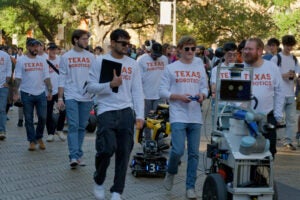To help support entrepreneurs and small-business owners — key drivers of prosperity in rural Texas — the IC² Institute at The University of Texas at Austin is funding new research on entrepreneurship in rural and small city environments.
UT Austin researchers funded by the institute will look at a range of ways to promote economic development including tracking regional entrepreneurship, promoting rural innovation networks and building economic resilience in areas where employment fluctuates with the cycles of the energy industry.
“Entrepreneurship is vital to all regions of Texas,” said President Gregory L. Fenves. “By partnering with entrepreneurs in rural communities across this great state, UT Austin can learn from them and share ideas that create opportunities for all Texans to improve their lives.”
Started in 1977 by George Kozmetsky as a “think-and-do tank” to promote economic development and good business practices, the IC² Institute is well known for helping cities around the world develop as innovation hubs. Historically, the institute has researched how science and technology are brought to market, sharing these findings across the U.S. and with people in more than 40 countries. In the process, IC2 played a significant role in the transformation of Austin into a thriving tech hub.
“Throughout his career, George Kozmetsky was concerned about wealth inequalities around the world. We felt it was important for the institute to bring its resources to tackle this problem,” said IC2 Executive Director Art Markman. “I view this new research on rural entrepreneurship as a return to the institute’s roots. After all, Texas has a large number of rural communities, and we have a duty to collaborate with these communities to support economic development.”
To spur innovation and entrepreneurial ecosystems in rural and small city environments, the institute is funding nine research projects:
Varun Rai (LBJ School of Public Affairs and Energy Institute) will explore the relationship among economic booms, entrepreneurial activity and economic resilience in rural West Texas to inform policymakers, energy producers and local communities about how best to create sustainable and resilient rural economies. In a related project, Sheldon Landsberger (Department of Mechanical Engineering) will work with communities and energy companies in West Texas to develop a new Rural Innovation Incubator model that prepares energy workers to transition to new jobs during economic downturns as a way for these companies to retain talent.
Rural communities must also establish an infrastructure in order to allow new ventures to succeed. One popular structure is the coworking space, which can provide a hub for entrepreneurs to gather to do their work and to share expertise. S. Craig Watkins (Department of Radio-Television-Film) will explore the effectiveness of these spaces in rural regions. John. S. Butler (Departments of Management and Sociology) will employ big data to map the influence of these coworking spaces on social networks. Sharon Strover (Department of Radio-Television-Film, Technology and Information Policy Institute) will explore the relationship between broadband access and entrepreneurial outcomes in rural regions.
To address the issue of attracting and retaining business talent in rural areas, Wenhong Chen and Joe Straubhaar (Departments of Media Studies and Sociology, and Radio-Television-Film) will investigate how local media in rural areas (especially digital media) can provide information that will attract entrepreneurs and make residents aware of opportunities for new ventures.
Junfeng Jiao and Jason Abrevaya (Departments of Community Planning and Economics) will focus on developing a “Rural Entrepreneurial Score” for selected regions in Texas to track growth in entrepreneurship and plan public projects. New UT faculty member Steven Pedigo’s work (LBJ School of Public Affairs) will create a blueprint for economic development in rural regions, drawing on his success at developing blueprints for urban areas.
Not all of the funded studies are focusing on the United States. Raissa Fabregas (LBJ School of Public Affairs) will combine insights from behavioral, development and agricultural economics to study factors that hinder social learning in small farm settings in western Kenya to understand how rural regions can increase their adoption of new technologies. Ji Ma (LBJ School of Public Affairs) will explore the motivations of rural residents who have migrated to urban areas in China to understand the effectiveness of strategies to encourage former residents to return to their home regions with an entrepreneurial mindset for new economic opportunities.
In all of these projects, the IC² Institute is encouraging investigators to think about ways their findings can translate into policy recommendations and programs for rural economic development.




